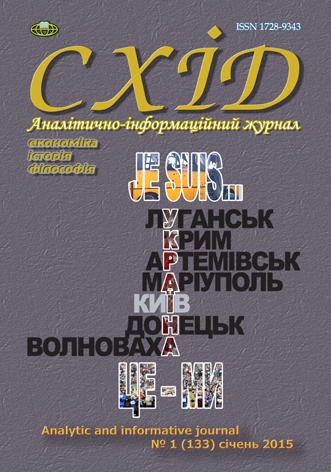Narrative Theology in the works of Ukrainian Protestant researchers
DOI:
https://doi.org/10.21847/1728-9343.2015.1(133).40167Keywords:
Narrative Theology, Ukrainian Protestantism, Apostolic Creed, Linguistic Religious StudiesAbstract
The article reviews the variety of narrative methodologies in contemporary Ukrainian Protestant Theology and reveals universal instruments that could be used in textual analysis from the position of Religious Studies.
The author suggests her own approach to classification of narrative sources of domestic Protestantism. Basing on this approach, she clarifies the discrepancies between Protestant self-presentation of their narrative sources and analysis of these sources from the position of Religious Studies. In particular, she proves that Ukrainian Protestant thought, mastering the achievements of Narrative Theology, made special accent on the role of community that interprets the Bible and itself. Ukrainian Protestant intellectuals, granting this central place to local community, consciously used Narrative Theology in order to interpret the domestic Protestant tradition (A. Puzynin). Another domestic researcher (R. Soloviy) claimed that this accent on special significance of community and its spiritual experience, characteristic for Ukrainian Protestants, betokens Post-Conservative type of Protestant Theology in Post-Modern times.Downloads
References
Tyselton E. (2011), Hermeneutics, Kollokvium, Cherkassy, 430 p. (rus).
Rayt N. T. (2007), Authority of the Pysania and power of God, Kollokvium, Cherkassy,152 p. (rus).
Hayes R. (2005), New Testament ethics, BBY, Moscow, 712 p. (rus).
Reith N.T. (2013) New Testament and God's people, Kollokvium, Cherkassy, 704 p. (rus).
Vankhuzer K.Dzh. (2007), Art of Understanding text. Lyteraturovedcheskaya ethical and tolkovanye Pysania, Kollokvium, Cherkassy, 736 p. (rus).
Bryuhheman W. (2012), Imagination of the Prophet, Kollokvium, Cherkassy, 231 p. (rus).
Osborn H.R. (2009), Hermeneutical spiral: a general introduction to biblical interpretation, EAAA, Odessa, 728 p. (rus).
Horbachenko T.N. (2001), The influence of Christianity on the formation of written culture of Russia-Ukraine: religious-philosophical aspect, Akademiya, Kyiv, 272 p. (ukr).
Bohachevska I. V. (2005), Christian narrative tradition: Methodology Philosophy and religion studies, Svit Znan, Kyiv, 235 p. (ukr).
Kondiuk D. (2013), Filosofska dumka-Sententiae: Special issue, № 4 "Hermeneutics of tradition and modernity in theology and philosophy", VDTU, Vinnytsya, p. 118-132 (ukr).
Kondiuk D. (2012), Theological reflection. Special issue of "Church and Mission", EAAA, Odessa, p. 62-78 (ukr).
Kondiuk D. (2008), Theological reflection, № 9, EAAA, Odessa, p. 35-53 (ukr).
Schatalov Y. (2013), Filosofska dumka-Sententiae: Special issue, № 4 "Hermeneutics of tradition and modernity in theology and philosophy", VDTU, Vinnytsya, p. 254-280 (ukr).
Puzynin A. (2012), Master Jesus. A comparative study of ancient models of discipleship, Kollokvium, Cherkassy, 176 p. (rus).
Puzynin A. (2010), Evangelical Christian tradition: the study of identity and theology from its beginnings to the present day, BBY, Moscow, 523 p. (rus).
Puzynin A. (2012), Theological reflection, № 9, EAAA, Odessa, p. 7-31 (rus).
Baumeyster A. (2014), Being and benefit, T.P. Baranovska Publisher, Vinnytsya, 418 p. (ukr).
Nahirniak A. (2014), The ascetics of faith, Knyhonosha, Kyiv, 307 p. (rus).
Reshetnikov Yu., Sannikov S. (2000), Review the history of Evangelical Baptist brotherhood in Ukraine, Bohomysliie, Odessa, 246 p. (rus).
Soloviy R. (2012), The resulting church, Kollokvium, Cherkassy, 328 p. (ukr).
Kyunh H. (2000), The great Christian thinkers, Aleteya, Moscow, 442 p. (rus).
Küng H. (1992), Put, № 2, p. 144-159 (rus).
Hrents S., Olson R. (2011), Theology and theologians of the XX century, Kollokvium, Cherkassy, 520 p. (rus).
Downloads
Published
How to Cite
Issue
Section
License
Copyright (c) 2015 Maryna Panchenko

This work is licensed under a Creative Commons Attribution-NonCommercial-NoDerivatives 4.0 International License.
1. Authors bear responsibility for the accuracy of facts, quotations, numbers and names used.
2. Manuscripts are not sent back.
3. The publisher does not always agree with the authors' opinion.
4. The authors reserve the right to authorship of the work and pass the first publication right of this work to the journal under the terms of a Creative Commons Attribution-NonCommercial-NoDerivatives 4.0 International License. This license allows others to distribute (copy) the published work for non-commercial purposes, provided there is mandatory attribution to its authors and a link to the first publication in our journal.
5. The authors have the right to conclude separate supplement agreements that relate to non-exclusive work distribution in the form in which it has been published by the journal (for example, to upload the work to the online storage of the journal or publish it as part of a monograph), provided that the reference to the first publication of the work in this journal is included.

